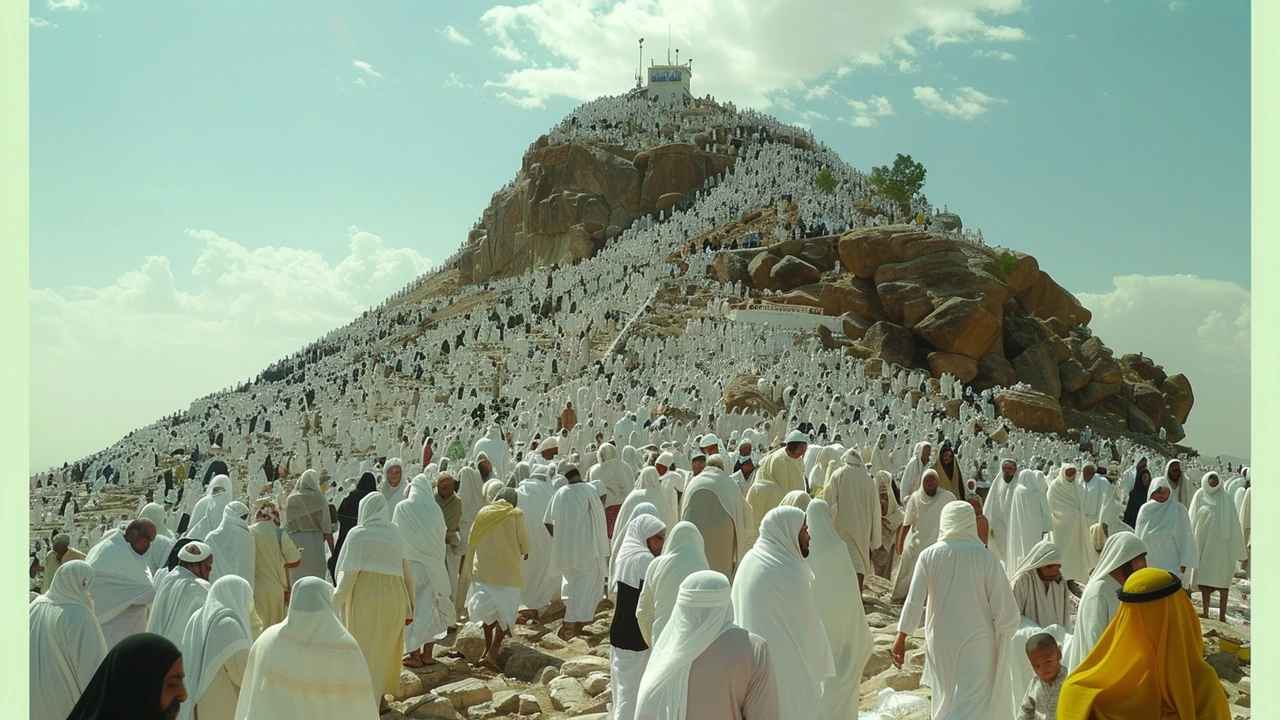Around 2 Million Pilgrims Ascend Mount Arafat for the Most Spiritual Day in Hajj
16 Jun, 2024Mass Gathering at Mount Arafat: A Profound Spiritual Experience
On an extraordinary day of spiritual significance, approximately 2 million Muslim pilgrims made their way to Mount Arafat in Mecca, Saudi Arabia. This mass convergence marks the most critical day of the Hajj pilgrimage, known as the Day of Arafat. The event holds a deep meaning for Muslims worldwide, as it is a time dedicated to intense prayer, reflection, and seeking forgiveness from Allah.
The Day of Arafat is considered the pinnacle of the Hajj pilgrimage, which is one of the five pillars of Islam. The pilgrims gathered at Mount Arafat engage in heartfelt prayers and supplications, seeking spiritual rejuvenation and divine mercy. The atmosphere is charged with a sense of unity and devotion, as the sea of worshippers, all clad in the traditional white robes known as 'ihram,' come together in this remarkable assembly.
Extensive Preparations by Saudi Authorities
Ensuring the safety and comfort of such a vast crowd requires meticulous planning and execution. The Saudi authorities have gone to great lengths to make the pilgrimage as smooth as possible for the millions of attendees. Extensive security measures were deployed to maintain order and manage the large influx of people. Security personnel were stationed throughout the pilgrimage site, vigilant and ready to assist as needed.
In addition to security, medical facilities were set up to handle any health emergencies that might arise. The provision of essential services, including water, food, and sanitation, was also given top priority. This level of preparation underscores the importance of the Hajj pilgrimage to the Saudi government and the lengths they go to accommodate the spiritual needs of the pilgrims.
The Significance of 'Ihram' and the Day of Arafat
The traditional white robes worn by the pilgrims, known as 'ihram,' are a symbol of purity, unity, and equality. These simple garments signify the wearer's intent to abandon worldly distractions and focus entirely on their spiritual journey. The sight of millions of pilgrims in ihram, all moving with a shared purpose, is truly a spectacle of faith and devotion.
The Day of Arafat itself is of tremendous spiritual importance. It commemorates the Prophet Muhammad's Farewell Sermon, delivered on this mount during his last pilgrimage. According to Islamic belief, the day is an opportunity for pilgrims to cleanse their past sins and seek a fresh beginning. For many, it is the most important and emotional day of the pilgrimage, a day of profound personal reflection and transformation.
Proceeding to Muzdalifah and Continuing the Pilgrimage
After spending the day at Mount Arafat, the pilgrims proceeded to Muzdalifah, another significant location on the Hajj route. Here, they spent the night under the open sky, gathering pebbles to be used the following day in the symbolic stoning ritual. This ritual, known as 'Ramy al-Jamarat,' involves casting stones at three pillars, representing the defiance and rejection of evil, commemorating the Prophet Ibrahim's (Abraham) resistance to the devil's temptations.
The pilgrimage's meticulous steps highlight not just physical endurance but also the continuous effort for spiritual refinement. By participating in these rites, pilgrims honor the profound traditions of their faith, drawing closer to the divine while reinforcing their sense of community and shared belief.

The Broader Impact of Hajj
The annual pilgrimage to Mecca holds immense significance beyond its religious dimensions. Economically, it provides a substantial boost to the Saudi Arabian economy, given the massive influx of visitors and the resulting demand for goods and services. Socially and culturally, the Hajj presents an unparalleled opportunity for Muslims from different corners of the globe to come together, fostering a unique spirit of global Islamic unity.
For individual pilgrims, the journey to Mount Arafat and beyond is often life-changing. The physical and spiritual challenges they overcome, the profound moments of spirituality, and the sense of solidarity with their fellow pilgrims create lasting memories. Many describe the Hajj as a peak experience that reshapes their religious perspectives and strengthens their faith.
Completion of the Hajj Pilgrimage
The culmination of the Hajj pilgrimage is marked by a sense of accomplishment and a renewed spiritual vigor. As the pilgrims complete their journey, returning to their home countries, they carry with them the lessons and blessings of this profound religious experience. The Hajj pilgrimage for the year is expected to conclude on June 17, 2024, after which the pilgrims will bring back stories of faith, resilience, and unity to their communities.
In conclusion, the gathering at Mount Arafat and the subsequent rites of the Hajj pilgrimage represent not just a series of religious obligations, but a deeply personal and communal journey. It is a testament to the enduring strength of faith and the unifying power of shared spiritual experience. As the pilgrims ascend Mount Arafat, they participate in a tradition that has been carried through centuries, contributing to the continuous tapestry of Islamic heritage and devotion.

 by
by